Fleurs du Mal Magazine


Or see the index
Christian Kunda Mutoki porte un nouveau regard sur Le Horla de Guy de Maupassant.
 Il est précédé d’une préface et suivi d’une postface.
Il est précédé d’une préface et suivi d’une postface.
Il vient rafraîchir les problématiques qui touchent à la morale, à l’athéisme, à des amours tumultueuses et infidèles. . .
Le monde d’aujourd’hui diffère-t-il de celui décrit au XIXe siècle par l’écrivain français ? La science a-t-elle amélioré la condition existentielle de l’homme ?
Voici quelques questions majeures qui trouvent ici un regard neuf.
Christian Kunda Mutoki a préparé sa thèse de doctorat à l’Université Paul Verlaine, actuelle Université de la Lorraine (Metz, France). Il est écrivain et professeur de Littérature et civilisation françaises à l’Université de Lubumbashi, en RDC.
GUY DE MAUPASSANT
Une certaine idée de l’homme dans Le Horla
Christian Kunda Mutoki
Cahiers des sciences du langage
Langue Linguistique Littérature
Broché
Format : 15,5 x 24 cm
ISBN : 978-2-8066-3665-2
14 décembre 2018
70 pages
€ 11,5
# New books
Une certaine idée de l’homme dans Le Horla
de Guy de Maupassant
Christian Kunda Mutoki
• fleursdumal.nl magazine
More in: - Book News, - Bookstores, Archive M-N, Archive M-N, Art & Literature News, Guy de Maupassant, Maupassant, Guy de, Maupassant, Guy de

Les heures de la nuit – Poéme
Nous sommes des Heures heureuses
Par qui le Plaisir est conduit;
Quand les étoiles amoureuses
Percent le voile de la nuit,
Près de la beauté qui repose,
Œil entr’ouvert, bouche mi-close,
Vers un lit parfumé de rose,
Nous guidons César et l’Amour.
Et, là, nous demeurons sans trêve
Jusqu’au moment où, comme un rêve,
L’Aube naissante nous enlève
Sur le premier rayon du jour.
Gérard de Nerval
(1808 – 1855)
Les heures de la nuit – Poéme
• fleursdumal.nl magazine
More in: Archive M-N, Nerval, Gérard de, Nerval, Gérard de
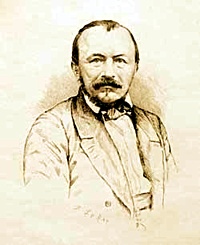
Pensée de Byron – Élégie
Par mon amour et ma constance,
J’avais cru fléchir ta rigueur,
Et le souffle de l’espérance
Avait pénétré dans mon coeur ;
Mais le temps, qu’en vain je prolonge,
M’a découvert la vérité,
L’espérance a fui comme un songe…
Et mon amour seul m’est resté!
Il est resté comme un abîme
Entre ma vie et le bonheur,
Comme un mal dont je suis victime,
Comme un poids jeté sur mon coeur!
Pour fuir le piège où je succombe,
Mes efforts seraient superflus;
Car l’homme a le pied dans la tombe,
Quand l’espoir ne le soutient plus.
J’aimais à réveiller la lyre,
Et souvent, plein de doux transports,
J’osais, ému par le délire,
En tirer de tendres accords.
Que de fois, en versant des larmes,
J’ai chanté tes divins attraits !
Mes accents étaient pleins de charmes,
Car c’est toi qui les inspirais.
Ce temps n’est plus, et le délire
Ne vient plus animer ma voix;
Je ne trouve point à ma lyre
Les sons qu’elle avait autrefois.
Dans le chagrin qui me dévore,
Je vois mes beaux jours s’envoler;
Si mon oeil étincelle encore,
C’est qu’une larme va couler!
Brisons la coupe de la vie;
Sa liqueur n’est que du poison;
Elle plaisait à ma folie,
Mais elle enivrait ma raison.
Trop longtemps épris d’un vain songe,
Gloire ! amour ! vous eûtes mon coeur:
O Gloire ! tu n’es qu’un mensonge;
Amour! tu n’es point le bonheur!
Gérard de Nerval
(1808 – 1855)
Pensée de Byron – Élégie
fleursdumal.nl magazine
More in: Archive M-N, Byron, Lord, Nerval, Gérard de
Literary and music group Feest der Poëzie brings a theatrical lecture on the life and work of Oscar Wilde and one of his favorite beverages – absinthe. This Saturday at the Pianola Museum, 8.30 PM.

Immerse yourself in the story of one of the best-loved writers in the English language with prose, poetry, songs and drama by Oscar Wilde and his contemporaries, on a journey through his rise and fall.
Poet and absintheur David Kwa will demonstrate the absinthe ritual and read manifold roles, such as that of the dreaded Marquess of Queensberry.
Daan van de Velde (piano) and Susanne Winkler (soprano) will perform Irish and English art songs, as performing poet Simon Mulder takes on the roles of narrator and Oscar Wilde (indeed, wearing a contemporary pair of silk breeches) in the fascinating story of his life.
Also, Van de Velde and Mulder will bring the very special performance of a long lost work for piano and voice on Wilde’s ‘Ballad of Reading Gaol’ by early 20th century composer Henri Zagwijn.
The Poetry Bar will bring you carefully prepared absinthe, along with a decadent sonnet.
Saturday the 24th of November 2018
venue open: 8 PM
start: 8.30PM
(English spoken)
venue:
Pianola Museum
Westerstraat 116
Amsterdam
Tickets: € 15/12.50
www.feestderpoezie.nl
trailer: www.youtube.com/watch?v=-V6yx3X8rwg
Music, stories, absinthe and more during ‘The Green Hour’ with Oscar Wilde
fleursdumal.nl magazine
More in: # Music Archive, Archive M-N, Archive W-X, Art & Literature News, Literary Events, THEATRE, Wilde, Oscar, Wilde, Oscar
À l’occasion de la sortie de son album Pauvre chanson, au titre éponyme, Marie Modiano mêle pour la première fois chansons et poèmes dans un même recueil.
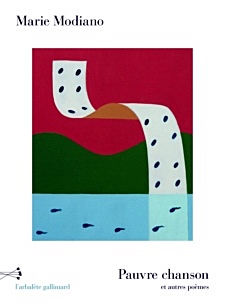
Autour des dix chansons interprétées sur ce nouveau disque, elle a écrit une quarantaine de ballades, petites proses, poèmes en vers libres ou comptés.
Y surgissent ses personnages, réels ou imaginaires : aventuriers, poètes, fous, amoureux, femmes perdues… habitants de paysages sans cesse recomposés.
Marie Modiano
Pauvre chanson et autres poèmes
Collection L’arbalète/Gallimard, Gallimard
Parution : 01-02-2018
Genre : Poésie
Littérature française
Époque : XXIe siècle
Prix : €12,50
128 pages
140 x 190 mm
ISBN : 9782072768156
Gencode : 9782072768156
Code distributeur : G01436
new poetry
fleursdumal.nl magazine
More in: #Editors Choice Archiv, - Book News, Archive M-N, Art & Literature News

Notre-dame de Paris – Poéme
Notre-Dame est bien vieille : on la verra peut-être
Enterrer cependant Paris qu’elle a vu naître;
Mais, dans quelque mille ans, le Temps fera broncher
Comme un loup fait un bœuf, cette carcasse lourde,
Tordra ses nerfs de fer, et puis d’une dent sourde
Rongera tristement ses vieux os de rocher!
Bien des hommes, de tous les pays de la terre
Viendront, pour contempler cette ruine austère,
Rêveurs, et relisant le livre de Victor:
—Alors ils croiront voir la vieille basilique,
Toute ainsi qu’elle était, puissante et magnifique,
Se lever devant eux comme l’ombre d’un mort!
Gérard de Nerval
(1808 – 1855)
Notre-Dame de Paris – Poéme
fleursdumal.nl magazine
More in: Archive M-N, FDM in Paris, Nerval, Gérard de, Nerval, Gérard de
Sinds de vertaling van Marko Fondse van Majakovski’s werken uitkwam, vijfentwintig jaar geleden, is diens poëzie niet meer weg te denken uit de Nederlandse boekhandel. De ongeëvenaarde lenigheid van de taal die Fondse wist aan te boren zette de dichter hier voorgoed op de kaart.
 Met de ge-update versie van de poëzie van Majakovski zijn zijn beroemde poèma’s en andere gedichten nu weer beschikbaar. Het bekende Een wolk in broek en Mens, die dateren van voor de revolutie van 1917, laten de gepassioneerde (liefdes)dichter in optima forma zien. De grote gedichten Ik heb lief en Daarover, van na de revolutie, zijn twee positieve uitzonderingen op de socialistische poëzie waaraan Majakovski zijn dichterschap ten slotte offerde: daarin keert de bravoure van zijn vroege lyriek even terug.
Met de ge-update versie van de poëzie van Majakovski zijn zijn beroemde poèma’s en andere gedichten nu weer beschikbaar. Het bekende Een wolk in broek en Mens, die dateren van voor de revolutie van 1917, laten de gepassioneerde (liefdes)dichter in optima forma zien. De grote gedichten Ik heb lief en Daarover, van na de revolutie, zijn twee positieve uitzonderingen op de socialistische poëzie waaraan Majakovski zijn dichterschap ten slotte offerde: daarin keert de bravoure van zijn vroege lyriek even terug.
Deze uitgave van Majakovski’s poëzie is voor de gelegenheid aangevuld met een grote hoeveelheid gedichten uit zijn enorme oeuvre. Vele daarvan verschenen niet eerder in Nederlandse vertaling. De herziening en uitbreiding zijn in handen van Majakovski-vertaler Yolanda Bloemen.
Alles waarvoor de dichter Vladimir Majakovski (1893–1930) hartstochtelijk leefde en werkte, de revolutie en de opbouw van het socialisme, is een eeuw na zijn geboorte grondig in diskrediet geraakt en ineengestort. Naar Majakovski’s socialistische poëzie kijkt bijna geen mens meer om. Wel wordt zijn voorrevolutionaire werk nog gelezen: de gedichten van Een wolk in broek tot en met Mens, een ding, met hun unieke mixtuur van lyrische, epische en dramatische kwaliteiten. Na 1917 wist Majakovski zich nog twee maal van zijn socialistische preoccupaties los te maken in de twee grote poëma’s Ik heb lief en Daarover (1921-1923).
Auteur: Vladimir Majakovski
Titel: Verzamelde gedichten
Vertalingen: Marko Fondse, Yolanda Bloemen e.a.
Taal: Nederlands
Uitgever: Uitgeverij van Oorschot
Bindwijze: Paperback
Verschijningsdatum: september 2018
Druk: 1e druk
Afmetingen: 21 x 13 x 2,9 cm
Aantal pagina’s: 480
ISBN-13 9789028280915
ISBN-10 902828091X
€ 29,99
# new poetry translations
Vladimir Majakovski
fleursdumal.nl magazine
More in: - Book Lovers, - Book News, Archive M-N, Archive M-N, Art & Literature News, Constructivism, Constuctivisme, Majakovsky, Vladimir, TRANSLATION ARCHIVE
Selected Poems 1968-2014 offers forty-five years of work drawn from twelve individual collections by a poet who ‘began as a prodigy and has gone on to become a virtuoso’ (Michael Hofmann).
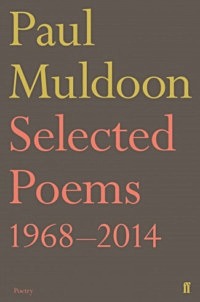 Hailed by Seamus Heaney as ‘one of the era’s true originals’, Muldoon seems determined to escape definition yet this volume, chosen by the poet himself, serves as an indispensable introduction to his trademark combination of intellectual high jinx and emotional honesty. Among his many honours are the Pulitzer Prize for Poetry and the Shakespeare Prize ‘for contributions from English-speaking Europe to the European inheritance.’
Hailed by Seamus Heaney as ‘one of the era’s true originals’, Muldoon seems determined to escape definition yet this volume, chosen by the poet himself, serves as an indispensable introduction to his trademark combination of intellectual high jinx and emotional honesty. Among his many honours are the Pulitzer Prize for Poetry and the Shakespeare Prize ‘for contributions from English-speaking Europe to the European inheritance.’
Paul Muldoon was born in County Armagh in 1951. He read English at Queen’s University, Belfast, and published his first collection of poems, New Weather, in 1973. He is the author of ten books of poetry, including Moy Sand and Gravel (2002), for which he received the Pulitzer Prize for Poetry, and Horse Latitudes (2006). Since 1987 he has lived in the United States, where he is the Howard G. B. Clark Professor in the Humanities at Princeton University. From 1999 to 2004 he was Professor of Poetry at Oxford University. A Fellow of the Royal Society of Literature, Paul Muldoon was given an American Academy of Arts and Letters award in 1996. Other recent awards include the 1994 T. S. Eliot Prize, the 1997 Irish Times Poetry Prize, and the 2003 Griffin Prize.
Paul Muldoon
Selected Poems 1968–2014
Published 01/06/2017
Publisher: Faber & Faber
Length 240 pages
Language: English
ISBN-10: 0571327966
ISBN-13: 978-0571327966
Paperback
£12.99
# new books
fleursdumal.nl magazine
More in: - Book News, - Bookstores, Archive M-N, Art & Literature News

A Madame Sand
« Ce roc voûté par art, chef-d’oeuvre d’un autre âge,
Ce roc de Tarascon hébergeait autrefois
Les géants descendus des montagnes de Foix,
Dont tant d’os excessifs rendent sûr témoignage. »
O seigneur Du Bartas ! Je suis de ton lignage,
Moi qui soude mon vers à ton vers d’autrefois ;
Mais les vrais descendants des vieux Comtes de Foix
Ont besoin de témoins pour parler dans notre âge.
J’ai passé près Salzbourg sous des rochers tremblant ;
La Cigogne d’Autriche y nourrit les Milans,
Barberousse et Richard ont sacré ce refuge.
La neige règne au front de leurs pies infranchis ;
Et ce sont, m’a-t-on dit, les ossements blanchis
Des anciens monts rongés par la mer du Déluge.
Gérard de Nerval
(1808 – 1855)
A Madame Sand
fleursdumal.nl magazine
More in: Archive M-N, Archive S-T, George Sand, Nerval, Gérard de
Et puis, pas de rentrée littéraire sans Amélie Nothomb ! Vous le savez : Amélie Nothomb est la marraine de cette émission.
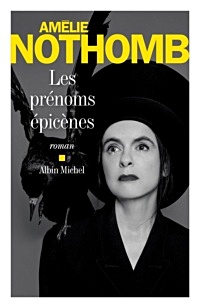 Elle sera donc à mes côtés pour ce premier rendez-vous de la saison et évoquera son 27ème roman, « Les prénoms épicènes » (Albin Michel), l’histoire d’une relation père-fille dans laquelle la frontière entre l’amour et la haine se montre particulièrement ténue.
Elle sera donc à mes côtés pour ce premier rendez-vous de la saison et évoquera son 27ème roman, « Les prénoms épicènes » (Albin Michel), l’histoire d’une relation père-fille dans laquelle la frontière entre l’amour et la haine se montre particulièrement ténue.
La Grande Librairie
Depuis 1992 et Hygiène de l’assassin, tous les livres d’Amélie Nothomb ont été publiés aux éditions Albin Michel. Elle a reçu, entre autres, le prix Chardonne, le Grand prix du roman de l’Académie française, le prix de Flore, et le Grand prix Jean Giono pour l’ensemble de son oeuvre. Ses oeuvres sont traduites dans 40 langues, des U.S.A. au Japon.
Amélie Nothomb est un écrivain belge de langue française. Elle est né le 13 août 1967 à Kobe, au Japon, où son père, le baron Patrick Nothomb, fut ambassadeur de Belgique. Belgique, qu’elle ne connaîtra qu’à 17 ans, pour y terminer ses études de philologie romane à l’Université libre de Bruxelles.
Depuis 1992, Amélie Nothomb publie aux éditions Albin Michel un roman par an.
Amélie Nothomb
Les Prénoms épicènes
Édition brochée
€17.50
22 Août 2018
130mm x 200mm
Broché: 162 pages
Editeur : Albin Michel
Collection : A.M. ROM.FRANC
Langue : Français
ISBN-10: 2226437347
ISBN-13: 978-2226437341
Dimensions du produit: 13 x 1,5 x 20,4 cm
Littérature française
Éditeur Albin Michel
Nombre de pages 162
Langue français
new books
fleursdumal.nl magazine
More in: - Book News, - Bookstores, Archive M-N, Archive M-N, Art & Literature News, Maison de la Poésie

Une femme est l’amour – Poéme
Une femme est l’amour, la gloire et l’espérance;
Aux enfants qu’elle guide, à l’homme consolé.
Elle élève le cœur et calme la souffrance,
Comme un esprit des cieux sur la terre exilé.
Courbé par le travail ou par la destinée,
L’homme à sa voix s’élève et son front s’éclaircit;
Toujours impatient dans sa course bornée,
Un sourire le dompte et son cœur s’adoucit.
Dans ce siècle de fer la gloire est incertaine :
Bien longtemps à l’attendre il faut se résigner.
Mais qui n’aimerail pas. dons sa grâce sereine,
La beauté qui la donne ou qui la fait gagner?
Gérard de Nerval
(1808 – 1855)
Une femme est l’amour – Poéme
fleursdumal.nl magazine
More in: Archive M-N, Nerval, Gérard de, Nerval, Gérard de
Osip Mandelstam is a central figure not only in modern Russian but in world poetry, the author of some of the most haunting and memorable poems of the twentieth century.
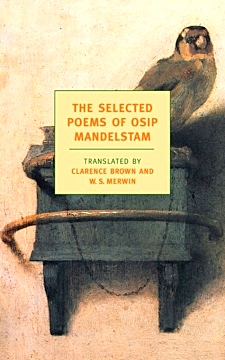 A contemporary of Anna Akhmatova, Marina Tsvetayeva, and Boris Pasternak, a touchstone for later masters such as Paul Celan and Robert Lowell, Mandelstam was a crucial instigator of the “revolution of the word” that took place in St. Petersburg, only to be crushed by the Bolshevik Revolution. Mandelstam’s last poems, written in the interval between his exile to the provinces by Stalin and his death in the Gulag, are an extraordinary testament to the endurance of art in the presence of terror.
A contemporary of Anna Akhmatova, Marina Tsvetayeva, and Boris Pasternak, a touchstone for later masters such as Paul Celan and Robert Lowell, Mandelstam was a crucial instigator of the “revolution of the word” that took place in St. Petersburg, only to be crushed by the Bolshevik Revolution. Mandelstam’s last poems, written in the interval between his exile to the provinces by Stalin and his death in the Gulag, are an extraordinary testament to the endurance of art in the presence of terror.
This book represents a collaboration between the scholar Clarence Brown and W. S. Merwin, one of contemporary America’s finest poets and translators. It also includes Mandelstam’s “Conversation on Dante,” an uncategorizable work of genius containing the poet’s deepest reflections on the nature of the poetic process.
Osip Mandelstam (1891–1938) was born and raised in St. Petersburg, where he attended the prestigious Tenishev School, before studying at the universities of St. Petersburg and Heidelberg and at the Sorbonne. Mandelstam first published his poems in Apollyon, an avant-garde magazine, in 1910, then banded together with Anna Akhmatova and Nicholas Gumilev to form the Acmeist group, which advocated an aesthetic of exact description and chiseled form, as suggested by the title of Mandelstam’s first book, Stone (1913).
During the Russian Revolution, Mandelstam left Leningrad for the Crimea and Georgia, and he settled in Moscow in 1922, where his second collection of poems, Tristia, appeared. Unpopular with the Soviet authorities, Mandelstam found it increasingly difficult to publish his poetry, though an edition of collected poems did come out in 1928. In 1934, after reading an epigram denouncing Stalin to friends, Mandelstam was arrested and sent into exile. He wrote furiously during these years, and his wife, Nadezhda, memorized his work in case his notebooks were destroyed or lost. (Nadezhda Mandelstam’s extraordinary memoirs of life with her husband, Hope Against Hope and Hope Abandoned, published in the 1970s, later helped to bring Mandelstam a worldwide audience.)
Clarence Brown is the author of a prize-winning biography of Mandelstam and is Professor Emeritus of Comparative Literature at Princeton.
W.S. Merwin was born in New York City in 1927 and grew up in Union City, New Jersey, and in Scranton, Pennsylvania. From 1949 to 1951 he worked as a tutor in France, Portugal, and Majorca. He has since lived in many parts of the world, most recently on Maui in the Hawaiian Islands. He is the author of many books of poems, prose, and translations and has received both the Pulitzer and the Bollingen Prizes for poetry, among numerous other awards.
The Selected Poems of Osip Mandelstam
by Osip Mandelstam, translated from the Russian by Clarence Brown and by W.S. Merwin
Paperback
Series: New York Review Books Classics
Pages: 192
Publ. Date: August 31, 2004
Language: English
ISBN-10: 1590170911
ISBN-13: 978-1590170915
Books That Everyone Should Read
fleursdumal.nl magazine
More in: Archive M-N, Mandelstam, Osip, REPRESSION OF WRITERS, JOURNALISTS & ARTISTS
Thank you for reading Fleurs du Mal - magazine for art & literature